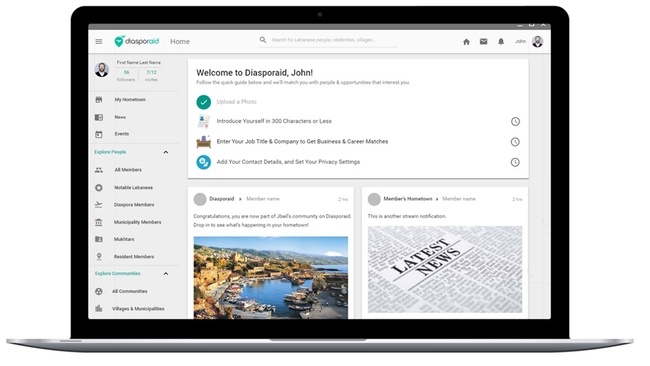How does it work? DiasporaID’s cutting-edge artificial intelligence (AI) asks diaspora members a series of simple questions to align their expertise and intentions with real-time needs and opportunities in their home villages, resulting in more purposeful and productive engagement of the diaspora in Lebanon. More than 500 site administrators and hometown ambassadors populate and maintain local municipal and village websites with local news, photos, events, influencers, and opportunities for diaspora members to give back. DiasporaID’s AI couples data on members’ usage with the connections they make with other members to continually enhance and refine the opportunities each member sees. DiasporaID’s AI engine also enables businesses in Lebanon to tap into new markets and expertise by linking them with Lebanese diaspora members around the world with expertise in particular sectors and/or geographic areas.
DiasporaID will: provide emotional, social and economic value to the registered members (expats and residents); catalyze the emergence of a collaborative economy through digital means; become a trusted and intelligent conduit of diaspora contribution to homeland development through time, talent and treasure; and be a driver of socio-economic evolution (trade, employment, development, entrepreneurship, funding, investment) and revolution (disruption, innovation, policy making).
DiasporaID is a newly launched platform. With only a few months of implementation completed, lessons learned are being gathered. It is recognized that each country that DiasporaID is adopted in, will require a level of personalization to meet country specific needs. Strong partnerships on the ground are also required to ensure information is reliable, local communities are aware of the platform, and membership is generated from organizations both locally and with Diaspora organizations abroad.
DiasporaID can be replicated across different sectors, and globally. Currently, the number of people living outside their country of origin has nearly tripled to more than 230 million. Diaspora populations often express the desire to contribute to their home communities, businesses, and governments but often don't have the connections or information on their home country available to make impacts. DiasporaID and its refined AI will be the connector diaspora communities need.
